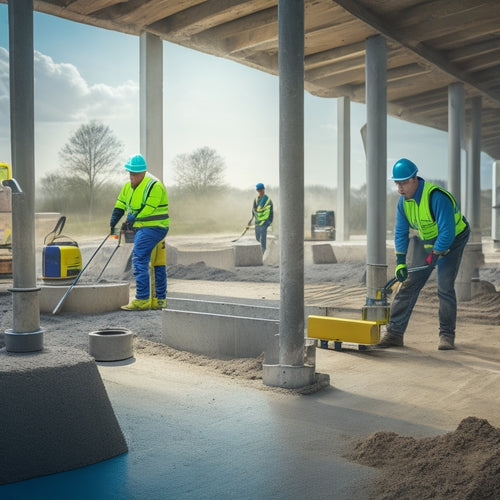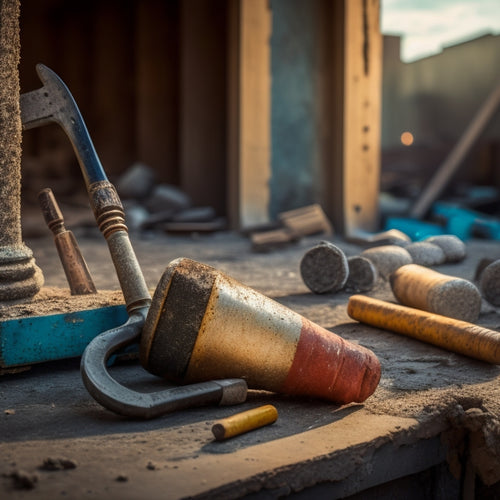
Top Rotary Tools for Concrete Drilling and Cutting
Share
When tackling concrete drilling and cutting projects, you'll need rotary tools that can deliver high torque and power output. Look for features like adjustable torque settings, heat-treated gears, and sealed bearings that guarantee smooth operation and extended tool life. Consider compact rotary tools for tight spaces, cordless options for flexibility, and high-torque tools for heavy-duty applications. Additionally, choose the right rotary bits and accessories for precision work, and don't forget about dust management solutions for a cleaner work environment. By selecting the right tools and features, you'll be able to efficiently and effectively drill and cut through concrete, and discover even more benefits and possibilities ahead.
Key Takeaways
• High-torque rotary tools with 8-15 amps of power output are essential for drilling through thick concrete and dense cinder blocks.
• Durable construction with heat-treated gears, sealed bearings, and robust motor housing ensures smooth operation and extended tool life.
• Variable speed control and adjustable torque settings allow for customization to varying concrete densities and drilling applications.
• Top brands like Bosch, DeWalt, and Makita offer high-performance rotary tools with ergonomic designs, advanced motor technology, and easy maintenance features.
• When choosing a rotary tool, consider factors such as drill speed, torque, bit capacity, and dust management solutions to ensure efficient and effective project completion.
Best Rotary Hammers for Cinder Blocks
When working with cinder blocks, you need a rotary hammer that can efficiently drill through their dense, porous structure. The right tool for the job can make all the difference with respect to speed and accuracy.
Cinder blocks are a common material in construction projects, and their unique properties require a specialized tool to handle various cinder block applications. A high-quality rotary hammer is vital for tasks such as drilling anchor holes, setting anchors, and making precise cuts.
To guarantee ideal performance, it's important to maintain your rotary tool properly. Regular rotary tool maintenance includes cleaning the tool, lubricating the hammer mechanism, and checking the chuck for wear.
Additionally, using the correct drill bits and accessories designed for masonry applications can greatly improve the tool's performance. By choosing the right rotary hammer and following proper maintenance procedures, you'll be able to tackle cinder block projects with confidence and achieve professional results.
With the right tool and proper care, you'll be able to complete your projects efficiently and effectively.
Top Cordless Rotary Drills Reviewed
You'll find that cordless rotary drills have become increasingly popular among professionals and DIYers alike, offering greater flexibility and convenience on the job site.
With the ability to drill and cut concrete without being tethered to a power source, cordless rotary drills provide unparalleled cordless versatility.
When selecting a cordless rotary drill, battery efficiency is essential to guarantee maximum runtime and minimize downtime. Look for drills with high-capacity batteries and efficient motors that optimize power output.
Top-rated cordless rotary drills feature advanced motor technology, such as brushless motors, which provide increased power and reduced maintenance.
Some models also boast advanced ergonomics, including adjustable handles and LED lights, to enhance user comfort and visibility.
When evaluating cordless rotary drills, consider factors such as drilling speed, torque, and bit capacity to guarantee the tool meets your specific needs.
With the right cordless rotary drill, you'll experience improved productivity and precision on the job site.
High-Torque Rotary Tools for Concrete
When working with high-torque rotary tools for concrete, you'll want to focus on two critical aspects: torque and power output, and durability and construction.
You'll need to evaluate the tool's ability to deliver high torque and power to effectively break through concrete, as well as its build quality and materials to withstand the rigors of this demanding task.
Torque and Power Output
High-torque rotary tools for concrete typically deliver between 8 and 15 amps of power output, generating sufficient torque to tackle demanding concrete applications.
When you're working with concrete, you need a tool that can handle the toughest tasks, and that's where high-torque rotary tools come in. These powerful tools are designed to provide the necessary force to drill through thick concrete, making them ideal for heavy-duty applications.
You'll want to evaluate the torque settings and power ratings when selecting a rotary tool for concrete drilling and cutting. Look for tools with adjustable torque settings, which allow you to customize the amount of force applied to the material. This feature is particularly useful when working with varying concrete densities.
Additionally, pay attention to the power ratings, as higher amps typically translate to increased torque and faster drilling speeds. By choosing a rotary tool with the right balance of power and control, you'll be able to tackle even the most challenging concrete projects with confidence.
Durability and Construction
Built to withstand the rigors of concrete drilling and cutting, high-torque rotary tools typically feature robust construction and durable components that minimize downtime and guarantee consistent performance.
When you're working with concrete, you need a tool that can keep up with the demands of the job. That's why high-torque rotary tools are built with heavy-duty construction materials that can withstand the intense forces involved in drilling and cutting concrete.
Here are some key features that contribute to the durability of high-torque rotary tools:
-
Heat-treated gears: Designed to withstand extreme temperatures and heavy loads, heat-treated gears guarantee smooth operation and extended tool life.
-
Sealed bearings: Protecting the tool's internal components from dust and debris, sealed bearings reduce maintenance needs and extend the tool's lifespan.
-
Durable motor housing: Built to withstand the rigors of concrete drilling and cutting, durable motor housing materials guarantee the tool can withstand impact and vibration.
- Easy tool maintenance: Many high-torque rotary tools feature easy-to-access components, making routine maintenance a breeze and reducing downtime.
Best Rotary Bits for Cinder Block Drilling
When you're drilling into cinder blocks, you'll want to choose a rotary bit that's up to the task.
You'll find that the material your bit is made of plays a significant role in its performance, so it's crucial to select the right one.
Bit Material Matters
You'll want to select rotary bits made from tungsten carbide (TC) or diamond-coated tips for efficient and effective drilling through cinder blocks, as they provide superior resistance to wear and tear.
When it comes to bit types, you'll find that TC bits are ideal for drilling through masonry, including cinder blocks, as they're extremely durable and can withstand the abrasive nature of the material. Diamond-coated bits, on the other hand, are better suited for drilling through harder materials like concrete and asphalt.
Here are some key considerations when choosing the right bit for your cinder block drilling project:
-
TC bits: Best for drilling through masonry and soft to medium-hard concrete.
-
Diamond-coated bits: Ideal for drilling through hard concrete, asphalt, and other abrasive materials.
-
Bit coatings: Look for bits with a thick, high-quality coating to reduce wear and tear.
- Bit geometry: A bit with a sharp, aggressive geometry will drill faster and more efficiently.
Drill Speed Counts
With the right bit material selected, it's now important to contemplate the drill speed that will enhance your cinder block drilling project. You'll want to find the ideal RPM for your specific drill bit and cinder block type. Too slow, and you'll struggle to make progress; too fast, and you'll risk overheating or damaging the bit.
For most cinder block drilling applications, a speed range of 500-1,500 RPM is preferable. However, this can vary depending on the bit size, material, and the specific demands of your project. It's crucial to consult your drill's user manual for guidance on speed adjustment. Some drills may have a variable speed control, allowing you to fine-tune the RPM to suit your needs.
When making adjustments, remember that smaller bits typically require higher RPMs, while larger bits benefit from slower speeds. By finding the sweet spot, you'll experience improved drilling efficiency, reduced wear on the bit, and a higher quality finish.
With the right drill speed, you'll be able to tackle even the most challenging cinder block drilling projects with confidence and precision.
Rotary Hammer Drills for Heavy-Duty Use
Tackle demanding concrete projects with rotary hammer drills, designed to deliver unparalleled power and durability for heavy-duty applications.
When you need to drill through thick concrete, reinforced materials, or demolish existing structures, these drills are your go-to tools. They provide the necessary force and speed to get the job done efficiently.
Here are some key factors to evaluate when choosing a rotary hammer drill for heavy-duty use:
-
Power and Torque: Look for drills with high wattage motors and robust torque output to tackle tough concrete projects.
-
Drill Speed and Bit Capacity: Opt for drills with variable speed control and large bit capacities to accommodate different drill bits and applications.
-
Ergonomics and Weight Distribution: Choose drills with comfortable grips, balanced weight distribution, and vibration reduction features to minimize fatigue and improve control.
- Performance Comparison and User Reviews: Research and compare different models based on performance metrics, user reviews, and ratings to find the best drill for your specific needs.
Top Brands for Cinder Block Cutting
When cutting through cinder blocks, contractors and DIYers alike rely on top-performing rotary tools from brands that have established a reputation for delivering precision and power. You need a tool that can efficiently execute advanced cutting techniques, such as plunge cutting and angle cutting, without compromising on speed or accuracy.
In this regard, top brands like Bosch, DeWalt, and Makita stand out for their exceptional performance in cinder block cutting. Bosch's rotary hammers, for instance, are renowned for their high-torque motors that enable fast and precise drilling.
DeWalt's grinders, on the other hand, are popular for their aggressive cutting action and dust-sealed switches that guarantee long tool life. Makita's rotary tools, with their powerful motors and ergonomic designs, offer unparalleled comfort and control during extended cutting sessions.
When comparing these brands, you'll notice distinct advantages and disadvantages. Bosch excels in heavy-duty applications, while DeWalt's grinders are ideal for smaller, more precise cuts.
Makita's tools, meanwhile, offer a perfect balance between power and portability. By understanding the strengths of each brand, you can choose the perfect rotary tool for your cinder block cutting needs.
Compact Rotary Tools for Tight Spaces
You'll often encounter tight spaces in concrete cutting projects, where larger rotary tools can't fit, and that's where compact rotary tools come into play, offering the precision and control you need to make accurate cuts in confined areas.
Compact rotary tools are designed with space efficiency in mind, allowing you to navigate tight corners and cut through concrete with ease.
Here are some key benefits of compact rotary tools:
-
Lightweight designs: Compact rotary tools are typically lighter, making them easier to maneuver in tight spaces.
-
Slim profiles: Narrow profiles enable you to access areas that larger tools can't reach, giving you more flexibility on the job site.
-
High-torque motors: Despite their compact size, these tools pack a punch, delivering the power you need to cut through concrete quickly and efficiently.
- Ergonomic grips: Compact rotary tools often feature ergonomic grips, reducing fatigue and improving control, even in tight spaces.
With compact rotary tools, you can tackle complex concrete cutting projects with confidence, knowing you have the precision and control you need to get the job done right.
Rotary Drills With Dust Collection Systems
As you move on to larger concrete cutting projects, having a reliable rotary drill with a dust collection system becomes vital for maintaining a clean and safe work environment.
Without a proper dust collection system, you'll be dealing with a massive amount of dust and debris that can compromise your health and visibility. Look for rotary drills that incorporate advanced dust extraction techniques, such as vacuum-assisted dust collection or cyclonic dust separators. These features guarantee that dust and debris are effectively captured, reducing the risk of respiratory issues and allowing you to focus on the task at hand.
When selecting a rotary drill with a dust collection system, pay attention to the filtration systems. Effective filtration systems, such as HEPA filters or multi-stage filtration, are essential for capturing 99.97% of particles as small as 0.3 microns. This guarantees that the air you breathe is clean, and the dust and debris are contained.
Most Durable Rotary Tools for Concrete
For tackling demanding concrete cutting projects, selecting a rotary tool built to withstand the rigors of heavy use is essential, and that's why durability becomes a top priority.
You need a tool that can handle the intense friction, heat, and vibration generated when cutting through concrete. To guarantee your rotary tool lasts, look for the best brands that prioritize durability, such as DeWalt, Bosch, and Makita.
Here are some key features to look for in a durable rotary tool:
-
Robust motor housing: A sturdy motor housing can withstand the harsh conditions of concrete cutting.
-
Heat-resistant components: Components designed to withstand high temperatures will reduce the risk of overheating and tool failure.
-
Sealed bearings: Sealed bearings protect the tool's inner workings from dust and debris, reducing wear and tear.
- Easy maintenance access: A tool with easy maintenance access allows you to perform routine maintenance tasks quickly and efficiently, reducing downtime.
Rotary Tools for Precision Cinder Block Work
When working with cinder blocks, precision is key, and a rotary tool that can deliver accurate cuts and control is essential for achieving professional-looking results. You need a tool that can navigate tight spaces and make precise cuts without compromising the structural integrity of the block.
To achieve this level of precision, you'll want to invest in a rotary tool with the right accessories. Here are some essential accessories to take into account:
| Accessory | Description |
|---|---|
| Diamond-coated cutting wheels | Ideal for making precise cuts in cinder blocks |
| Carbide-grit sanding drums | Effective for smoothing out rough edges and surfaces |
| Core drill bits | Perfect for drilling precise holes for anchors or pipes |
| Rotary hammer bits | Suitable for breaking up and removing excess material |
| Dust extraction attachments | Essential for minimizing dust and debris |
Frequently Asked Questions
Can I Use a Rotary Tool for Drilling Into Brick or Stone?
When you're tackling brick drilling or stone cutting, you're dealing with tough materials. You might wonder if a rotary tool is up to the task.
The answer is yes, but with caution. You'll need the right accessories, such as diamond-coated bits or carbide-tipped cutters, to effectively drill or cut through these hard surfaces.
Make sure you choose the correct speed and apply gentle to moderate pressure to avoid damaging the tool or material.
How Do I Maintain and Clean My Rotary Tool?
Did you know that 75% of rotary tool users don't follow proper maintenance routines, leading to premature wear and tear?
You're not one of them, though! To keep your rotary tool in top shape, you'll want to prioritize rotary tool maintenance and cleaning.
Regularly inspect and clean the tool's air vents, collet, and chuck to prevent dust buildup. Also, lubricate moving parts and store your tool in a dry place to extend its lifespan.
Are Rotary Tools Suitable for Left-Handed Users?
When it comes to using rotary tools, you might wonder if they're suitable for left-handed users. The good news is that most rotary tools are designed with ambidextrous ergonomics, making them accessible to both right- and left-handed users.
Look for tools with symmetrical designs and adjustable grips to guarantee comfortable handling.
Additionally, tool accessibility features like reversible handles or adjustable torque settings can further accommodate left-handed users' needs.
Can I Use a Rotary Tool for Mixing Materials Like Concrete?
Imagine yourself as a master builder, crafting a monumental structure that defies gravity.
Now, can you harness that creative energy to mix materials like concrete with a rotary tool? Yes, you can!
With the right mixing techniques and tool attachments, you'll be able to tackle even the toughest mixing tasks.
Look for attachments like mixing drums or paddles that can handle heavy materials, and experiment with different techniques to find what works best for you.
Are There Specific Rotary Tools for Drilling Into Rebar?
When drilling into rebar, you'll need specialized rotary tools designed for this task.
You can't rely on standard bits, as they'll quickly wear out or break.
Instead, look for rotary tool attachments specifically engineered for rebar drilling techniques.
These heavy-duty bits feature tungsten carbide or diamond-coated tips, allowing you to efficiently penetrate rebar with precision and control.
Conclusion
You've made it to the end of our extensive guide to the top rotary tools for concrete drilling and cutting.
Now that you've got a better understanding of the best options for your specific needs, it's time to put your newfound knowledge to the test.
Can you imagine the sense of accomplishment you'll feel after tackling that concrete project with the right rotary tool in hand?
Get out there and start drilling – your concrete won't cut itself!
Related Posts
-

Top DIY Concrete Grinding and Polishing Tools
When selecting DIY concrete grinding and polishing tools, you'll want to take into account a range of factors to guar...
-

What Tools Ensure Precise Concrete Leveling Results
You need a range of specialized tools to achieve precise concrete leveling results. Laser leveling instruments provid...
-

5 Tips for Splitting Concrete With Second-Hand Tools
When splitting concrete with second-hand tools, you'll need to be strategic to avoid wasting time, money, and putting...


